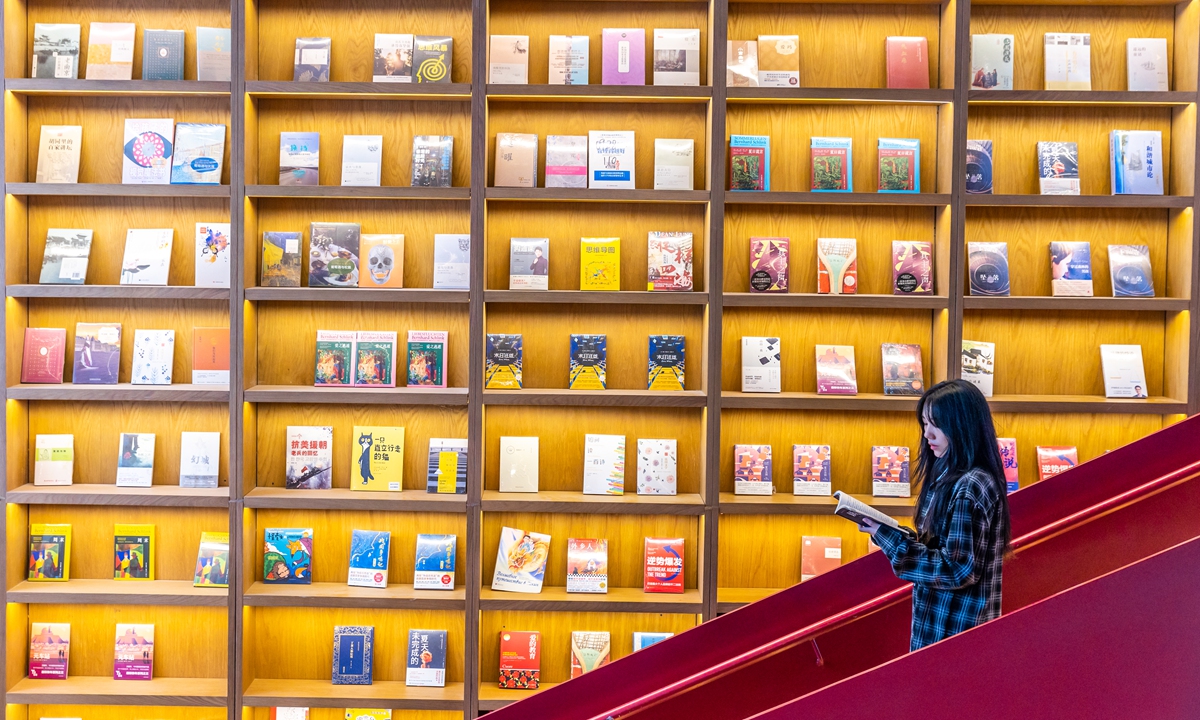
A woman reads a book at a bookstore in Nanjing, East China's Jiangsu Province, on April 23, 2024, World Book and Copyright Day. Photo: VCG
Following the announcement that the TSUTAYA bookstore in Xi'an, Northwest China's Shaanxi Province, is shutting down, the question about the sustainability of physical bookstores competing against new business models has once again triggered a heated discussion. While it's important for physical bookstores to find new way out, protecting cultural spaces in order to provide better customer service is essential for transforming trendy bookstores into sustainable ones.
As e-commerce continues to dominate our shopping habits, physical bookstores have tried to reinvent themselves as cultural and commercial hubs - offering more than just books, but also spaces for coffee and social media snapshots. Brands like SiSYPHE, Fang Suo Commune, and Yanjiyou bookstores have become popular, thanks to their aesthetic designs and diverse offerings such as cultural and creative products.
Zhang Yi, CEO of the iiMedia Research Institute and former vice president of a publishing house, told the Global Times that the difficulty facing some of the bookstores lies not with the new business models, but with the fundamental essence of what a bookstore should represent.
Indeed, it isn't necessary for bookstores to remain stuck in the traditional model of only selling books, but some of these trendy establishments have ventured too far into the realm of commercial entertainment, losing sight of their core mission of promoting books and fostering a literary culture.
A bookstore should be a haven for book lovers, aligning with China's longstanding tradition of "making friends through books." This practice, rooted in ancient Chinese history, emphasizes genuine connections over fleeting social media trends.
Another challenge facing these trending bookstores may be a lack of attention given to book selection. A bookseller who requested to remain anonymous noted that while these stores invest heavily in creating visually appealing spaces, they often fall short in offering a thoughtful, diverse range of books.
It's worth noting that it is not enough to rely on fleeting trends and creative merchandise. A bookstore must prioritize the integrity and cultural relevance of its book selection, and the space and activities should foster a genuine environment for cultural exchange and literary appreciation.
This challenge isn't limited to bookstores, as various commercial venues, including cafes, are finding the "influencer economy" no longer able to attract customers.
A cafe in East China's Jiangsu Province recently posted a notice discouraging patrons from visiting solely for taking photos, stating they would refuse to serve such customers. Many other cafes have also begun imposing restrictions on influencers taking photos during business hours.
A regular customer at YY. Cafe in Shanghai shared that while she initially visited for the coffee, the influx of influencers has diminished the experience, turning the space into a backdrop for private photoshoots rather than a place to enjoy a quiet drink.
While cafes have more inherent social attributes than bookstores, it is still more important to focus on the primary customer experience of serving coffee, and not let photo-obsessed visitors detract from the ambiance.
In response, more businesses are setting up rules to curb disruptive behavior such as photo-taking. While the allure of going viral can bring temporary attention and profit, it is essential to maintain focus on the overall customer experience.
Ultimately, what matters most to customers visiting a physical store - be it a bookstore or café - is the quality of the products and the experience itself. By aligning cultural aspirations with genuine consumer needs, businesses can better serve their customers. A strong focus on curated product selection and meaningful cultural services allows stores to carve out a unique identity and ensure their survival in a competitive marketplace.
The author is a reporter with the Global Times. life@globaltimes.com.cn




